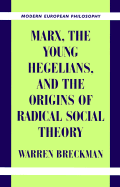Book contents
- Frontmatter
- Contents
- Acknowledgments
- Introduction
- 1 At the End of Idealism: From “Nihilism” to “Positive Philosophy”
- 2 The Transcendent Sovereign and the Political Theology of Restoration
- 3 Ludwig Feuerbach and Christian Civil Society
- 4 The Social and Political Discourse of Personality, 1835–1840
- 5 Pantheism, Social Question, and the Third Age
- 6 Arnold Ruge: Radical Democracy and the Politics of Personhood, 1838–1843
- 7 Karl Marx: From Social Republicanism to Communism
- Conclusion
- Bibliography
- Index
3 - Ludwig Feuerbach and Christian Civil Society
Published online by Cambridge University Press: 11 January 2010
- Frontmatter
- Contents
- Acknowledgments
- Introduction
- 1 At the End of Idealism: From “Nihilism” to “Positive Philosophy”
- 2 The Transcendent Sovereign and the Political Theology of Restoration
- 3 Ludwig Feuerbach and Christian Civil Society
- 4 The Social and Political Discourse of Personality, 1835–1840
- 5 Pantheism, Social Question, and the Third Age
- 6 Arnold Ruge: Radical Democracy and the Politics of Personhood, 1838–1843
- 7 Karl Marx: From Social Republicanism to Communism
- Conclusion
- Bibliography
- Index
Summary
“Protestant morality is and was a carnal mingling of the Christian with the man, the natural, political, civil, social man, or whatever else he may be called in distinction from the Christian.” This description in Ludwig Feuerbach's The Essence of Christianity suggests the complexity of the Young Hegelians' understanding of the interpenetration of Christian belief, politics, and society. By 1841, when Feuerbach published The Essence of Christianity, Young Hegelians like him clearly recognized the need to undo the “carnal mingling” of Christian otherworldliness with the worldly political and social subject. To separate the Christian from the “man” and thereby to liberate political, civil and social life from the distorting effects of Christian belief was one of the central tasks that Feuerbach set himself in his 1841 magnum opus. Yet this program did not emerge suddenly for Feuerbach and other Left Hegelians in the 1840s. We shall see in this chapter and the next two that during the 1830s, sociopolitical circumstances, as well as intellectual concerns and influences, led some left-wing Hegelians to criticize aggressively the social and political effects of Christian, particularly Protestant, belief.
Feuerbach was perhaps the first Hegelian to attack the nexus of Christian faith, politics, and society; accordingly, it is to his work during the 1830s that we turn first. Feuerbach's exploration of Christian culture and society gained greater and greater clarity and vitriol in a series of critical encounters with the personalism that had come to dominate Protestantism in his own day.
- Type
- Chapter
- Information
- Marx, the Young Hegelians, and the Origins of Radical Social TheoryDethroning the Self, pp. 90 - 130Publisher: Cambridge University PressPrint publication year: 1998

